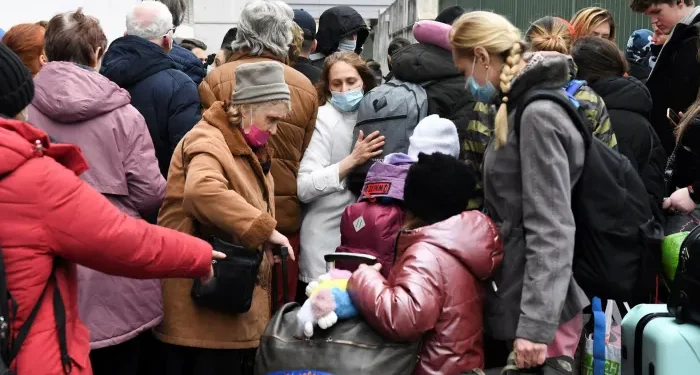Belgium (Brussels Morning Newspaper) The EU responded swiftly to aid the sufferers of the Ukraine war as millions of Ukrainians fled the country after Russia invaded. The European Union made certain arrangements to facilitate uprooted people to provide them with the chance to settle, work and find schools for their children.
Despite the strains those refugees are now putting on member states, economists believe that the fiscal burden should be manageable which means that refugees will be well placed to find work in tight labour markets where their skills are in high demand.
Ukraine war 2022 causing immense challenges for the EU since the invasion began on February 24. Jean Christophe Dumont, Head of migration at the OECD said “This is bigger than any other humanitarian crisis since the second world war”.
Ursula von der Leyen, the European commission president said “ The bloc would mobilise billions of euros to build reception centres, mobile hospitals and schools, and fund jobs and childcare”.
Ukraine war and EU crisis explained
The biggest change from the previous crisis in the EU’s decision to activate the temporary protection mechanism is giving the millions who have fled Ukraine since the start of the conflict the right to live and work in any member state.
More than 3.2 million people have left Ukraine since the Russian invasion began and it’s clearly exceeding in numbers who arrived in Europe from Syria over a two-year period in 2015-16.
The EU’s failure to share responsibility for refugees since that crisis has left thousands stuck behind barbed wire at borders, or crowded into camps in countries least equipped to cope.
Hanne Beirens, Director of migration policy institute Europe said “ It is very different from the past”. The Brussels-based think tank believes that the protection mechanism will lower the cost of hosting refugees and they will be able to move freely to find work for them of their choice.
Ukraine war and EU conflict
EU leaders are planning to reduce Europe’s dependency on Russian energy. They had not learned from the many instances when Russia used energy as a geostrategic instrument.
The Kremlin could switch off the gas taps to Ukraine as a means of applying political pressure on the government in Kyiv as it did during the early 2000s. It could decrease the supplies to European gas facilities as it did in late 2021.
In the past few years, the European Commission was asking its members to embrace the idea of diversified energy sources to reduce the dependency on Russia. The EU’s biggest economy Germany increased its dependency on Russian gas by a significant margin.
The construction of the Nord Stream one gas which enables Russia to send gas directly to Germany through the Baltic Sea is seemingly against the EU’s policy of Diversification.
After discussing with the United States and different European leaders, German Chancellor Olaf Scholz halted the project of Nord Stream 2 which was always going to increase that dependency.
EU response to Ukraine war 2022
The European Union and its citizens stand in full solidarity with Ukraine and its people. The EU has taken solid actions to support Ukraine and the neighbouring countries that are protecting people fleeing the war.
The measures include:
- Reception of refugees via a temporary protection mechanism.
- 93 million euros in humanitarian aid for Ukraine and Moldova.
- Material assistance to Ukraine and its neighbouring countries via EU civil protection and mechanics.
- Initiating the Ukraine solidarity Trust fund.
- Financial and technical support for member states hosting refugees.
- 1.2 billion euros in macro-financial assistance to create stability.
- 1 billion euros to support Ukraine’s armed forces.
EU leaders ready to set up solidarity Trust fund
At the European Council on 24-25 March 2022, EU leaders have decided to set up a solidarity trust fund to support Ukraine against the never stopping Russian military aggression.
The European Union stands in full solidarity with Ukraine and its people are committed to providing support for the reconstruction of democratic Ukraine.
EU leaders at the European Council discussed the safety of civilians, the development of contingency plans, nuclear and energy facilities.
EU leaders also discussed measures to mitigate the impact of high energy prices and to secure the supply of energy in EU member states, as the price of fuels has risen as a consequence of Russia’s war against Ukraine.
US President Joe Biden and Ukrainian president Volodymyr Zelensky joined the EU leaders for the European council via video conference.




